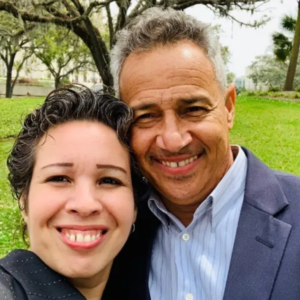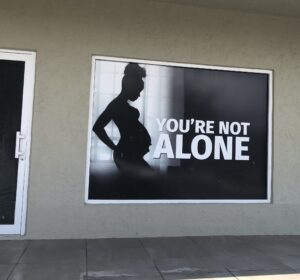Top taxpayer-funded anti-abortion center in Florida abruptly shuts down amid IRS trouble
Yohanka Reyes considers her anti-abortion crusade nothing short of a mission from God.
Reyes, who goes by “Yoi,” often tells her story of birthing a son at the age of 15 after being raped by her stepfather in Cuba, and how it inspired her life’s work to make sure all women are legally forced to have the babies of their rapists.
“I advocate on behalf of that one percent that even pro-lifers and Christians seem to approve of for abortion – cases of rape and incest,” the 44-year-old Reyes told a church congregation in Pembroke Pines back in 2016, her voice cracking with emotion. “… This is not a political issue, it is a Biblical issue.”
It was in 2014 that she and her husband Pete set out to “build God’s kingdom,” as Reyes put it, by founding Mary’s Pregnancy Resource Center (MPRC) in Fort Lauderdale, where she could minister to pregnant women and encourage them to bring their pregnancies to term, even if those pregnancies were caused by a rapist or family member.
To fund MPRC, Reyes turned to what might seem an unlikely source of money for such a religiously charged venture: the Florida taxpayers. MPRC was awarded a grant from the Florida Pregnancy Support Services Program in 2014 and has received millions of dollars from the state in the years since.

That state program funds roughly 100 such centers across the state with the stated purpose of promoting and encouraging childbirth. It has faced staunch criticism from reproductive rights groups, some of it contained in an in-depth 2021 report issued by the nonprofit Floridians for Reproductive Freedom, that the centers often effectively pose as actual medical clinics when they in fact offer scant health services (pregnancy tests and sonograms chiefly), dole out faulty medical information, exercise religious coercion, and operate with little to no government oversight.
Last year the state program paid out about $4 million to the centers, which number about 60 across Florida, and that amount is set to balloon to $25 million with the recent passage of the six-week abortion ban.
The state specifically forbids the centers to use religious content and coercion, yet a large number of them are overtly religious in nature, and some are run directly by churches and “ministries” like MPRC, which according to tax documents received from the state some $442,000 in 2020 and $528,000 in 2021, making it the single largest recipient of the program’s funds across the state.
The center, which encompasses a full three-quarters of an acre in a strip mall in west Hollywood, even comes with a prayer room – which Reyes dubbed the “war room” – complete with a cross on the wall. The MPRC’s motto: “Saving lives, reaching souls.”
“Every baby deserves to live and we seek to testify about Jesus through our unconditional services to their mothers,” wrote Reyes in a blog post linked to MPRC’s official website.
But now there are no women receiving any services at MPRC at all. Its parking lot sits empty.
The Florida Trident learned the center was abruptly shut down in April, with clients and employees left in the lurch. MPRC’s social media manager, Victoria Werner, said she wasn’t notified about the closing and had to find out about it from other employees.
Werner knew there were problems brewing when her paychecks were heavily delayed beginning last fall and Reyes became more and more isolated from the center and staff. In early June, Werner told theTrident that she hadn’t been paid yet for the months of March and April.
“I‘ve had to beg for my paychecks every month since October,” said Werner. “I’ve begged for information and the only time she responds is when I threaten to hire an attorney or to contact other board members.”
There appears to be a troubling reason behind the center’s shutdown: MPRC is facing multiple tax liens from the Internal Revenue Service totaling more than $150,000, according to official documents obtained by the Trident. A board member confirmed that the IRS in recent weeks provided notification that the center’s spending was under investigation as well.
The possible irregularities don’t end there. A search of the IRS database of tax-exempt organizations indicates MPRC hasn’t filed 990 tax forms, which are required to be filed annually by most non-profits, for many years. The Trident has also learned that the center’s required state registration as a 501(c)(3) non-profit organization expired in 2016.
Soliciting donations without registration with the state as a non-profit tax-exempt organization is a felony under Florida law, yet MPRC has continued to hold fundraisers and solicit donations from the public online for years after its registration expired.
On top of those apparent red flags, Reyes and her husband for the past couple of years have been absorbed by an entirely different calling: buying, showing, and breeding very expensive purebred St. Bernards, a vocation for which they bought an RV to travel to dog shows across the country. It’s more than a hobby: State corporate records show the couple formed St. Bernard Kingdom, LLC – their dog breeding and showing company – back in August 2021.
Werner said that well before the secretive closing of the center, the couple had become more and more distant from the operations at MPRC, almost always working from home. And she found it particularly galling that while she was going unpaid in early May the couple were showing their St. Bernards in the vaunted Westminster Kennel Club Dog Show at Arthur Ashe Stadium in Queens, New York.
“They’re distracted by their dogs and their new life,” said Werner. “But we’re getting paid by taxpayers’ dollars, so that’s not okay.”
And activists on the other side of the abortion debate say those tax dollars aren’t being protected in what they say is an essentially anything-goes program.
“There really is no oversight,” said Laura Guron Rodriguez, the state policy advocate in Florida for the National Council of Jewish Women and chair of the Floridians for Reproductive Freedom Fake Clinics Work Group. “If the state is giving them money, it needs to be regulated. If the state can regulate sliced meat they can regulate these centers.”
A “Messy Mistake”
Central to unraveling the troubles at Mary’s Pregnancy Resource Center was a call to one of its listed board members, Rebecca Kiessling, who is perhaps the best-known activist in the United States in favor of mandatory childbirth in cases of rape and incest.
Kiessling, who lives in Michigan and was herself conceived in rape, runs a non-profit called “Save the 1” – a reference to the one percent of abortions involving rape and incest – and has received a great deal of media attention, including a debate on CNN with high-profile attorney Gloria Allred and an in-depth feature in the New Yorker last December.

Not surprisingly, Kiessling and Reyes became close allies over the years within the relatively small coterie of “no exception” abortion activists. They would meet each year at March for Life rallies in Washington D.C. and Kiessling published Reyes’ story on her anti-abortion website. Kiessling was also a keynote speaker at an MPRC fundraiser in 2018 and posted a video tour of Reyes’ center in 2019, complete with a look at the “war room.”
“It’s a big part of this ministry to have this prayer,” Kiessling says in the video.
Kiessling was listed as a board member on state corporate records beginning in 2020, but when contacted on the phone by the Trident she cried foul.
“I’m not on that board,” said Kiessling. “[Reyes] asked me many years ago, and I said, ‘I don’t live in the state, no, I can’t be on the board when I don’t live there.’”
Keissling said that because she was erroneously listed as a board member, she was notified last October that MPRC was facing tax liens from the IRS in excess of $100,000, the first dated September 29, 2022, in the amount of $76,025.74 and the second dated the following week for $47,366.55.
On October 12, she texted Reyes to ask her about the liens and tell her to remove her name from the board of directors. Reyes, who writes in imperfect English, responded by text to address the IRS liens: “This is a messy mistake they got and I will remove you but no [our CPA has fixed] all these … they are closing the case.”
Reyes also wrote, “It’s just a harassment game because we are in Broward County and the politicians here are running on abortion and promising to closed [sic] us down.”
It was also in October, said MPRC employee Werner, that things at the center “started to get weird.”
*But after that, the IRS liens continued to pile up on MPRC, with two more totaling $29,559.03 posted in March and April, bringing the total to over $150,000, according to Broward County records supplied by Kiessling.
Reyes routinely worked from home, said Werner, in part due to health problems. At one point she forbade employees from texting her directly about work issues and instructed them to instead go through an on-site manager, Werner said.
At the same time, Reyes kept payroll and financial matters under tight wrap. “It was Yoi’s show,” said Werner. “Nobody else had any authority and nobody had access to any of the important paperwork, as far as I know.”
Starting in October, communication dropped off almost altogether, Werner said, and the employees began going unpaid.
“Our paychecks were a month and a half late,” said Werner, who lives in Texas and was working remotely for the center. “[Reyes] said the IRS had done an audit and ever since the audit happened the bank wouldn’t let any money out to us.”
She said paychecks were extremely late for January and February as well and that contacting Reyes became more and more difficult, prompting her to threaten to contact the board. Werner said Reyes then told her that the problem stemmed from an IRS audit that uncovered mistakes made by a previous treasurer and that MPRC’s bank accounts had been restricted as a result.
Reyes made periodic promises to pay, and at one point told her she was about to get a big donation, said Werner, but she continued to go unpaid. Then in late April she learned that the center had shut its doors.
“I was never given a directive to let our clients know online that we were closing,” Werner said. “On Google it says we’re still open. Nothing has been taken down.”
Kiessling, meanwhile, said she received a recent letter from the IRS notifying her that the agency was investigating MPRC’s spending. She has consulted an attorney and contacted the IRS but said the agent on the case had not returned her call.
Following interviews with Kiessling and Werner on June 1, the Trident left a detailed voice message with Reyes requesting comment. While Reyes didn’t respond, she contacted both women the following day and finally paid Werner for her work.
Reyes texted Kiessling: “We paid the issue with the IRS a long time ago and had an attorney because it was a huge mistake done on payroll taxes on year 2016 by our … financial secretary and have no issues with them.”
Kiessling, who has officially been removed from the MPRC board, and Werner both said they’re skeptical that the issues have truly been cleared up; the center remains closed and the phone lines are still disconnected.
“Distracted by their Dogs”
Shortly after Mary’s Pregnancy Resource Center closed its doors, Reyes appeared to be having the time of her life in New York.
“Glory be to God!” she wrote on social media on May 9, adding, “my heart is about to explode!”
The cause for celebration: two of her purebred St. Bernards, Cleopatra and King Solomon, won ribbons at the Westminster Kennel Club Dog Show. It was a huge day for Reyes in her new occupation.
Reyes and her husband traveled across the country with their three St. Bernards – King Solomon, Cleopatra, and Sheba. After Westminster, Reyes posted on social media that the couple had acquired a fourth St. Bernard pup named Lagherta. Social media posts reveal other St. Bernard Kingdom dog show appearances in Wyoming, Ohio, Kansas City, and Detroit, among other spots.
The dog show life isn’t cheap: In addition to the cost of the dogs (the farm from which Lagherta was purchased listed a price of $4,500 for St. Bernard pups), there are also transportation costs (including the RV purchase), handler fees, grooming costs, vet bills, and even chiropractor costs (yes, the dogs have their own chiropractor).
But the couple also expects to bring in significant revenue by breeding the dogs. On a St. Bernard Kingdom web page, Reyes is listing puppies at $7,500 each. With a typical litter size of about seven puppies, it could bring in substantial money. According to the website, a litter was due in early June.

Reading Reyes’ social media accounts over the last several months, one wouldn’t even know MPRC existed; it’s all about the couple’s dog business. And that doesn’t sit well with Werner.
“They spend all their time and energy doing that now,” she said. “They’re just distracted by their dogs and their new life.”
The big question, considering the IRS trouble, is whether Florida taxpayers’ money was misspent by MPRC. A call to the IRS brought no answers.
“We’re barred by law from discussing anything like that,” said IRS spokesman Eric Smith. “The mere existence of a public investigation, or closure of it, is not public record.”
The Florida Department of Health, which administers the state program that funds MPRC, had not answered emailed questions from the Trident at the time of publication. A detailed message sent to the Florida Pregnancy Care Network, which contracts with the state to run the program, was also met without response, as was a phone message left with its executive director, Rita Gagliano.
The centers have become accustomed to running with little to no oversight. Regulation is extremely lax, if not entirely non-existent. The centers are in fact called upon to “self-monitor” their own operations, making it less than shocking should the state not check simple matters like whether the organizations are filing the required 990 tax forms or registering as non-profits.
Many activists and policy makers have called for increased regulation of the facilities, especially with the expected $20 million increase in taxpayers’ funds set to go to the program when the six-week ban is implemented.
“The money is ungoverned and unwatched,” said Jane Graham, women’s right activist and past board member of Planned Parenthood of Southwest and Central Florida. “It’s unconscionable. People want accountability.”
About the Author: Bob Norman is an award-winning investigative reporter who serves as Editor-in-Chief of the Florida Trident and journalism program director for the Florida Center for Government Accountability.
